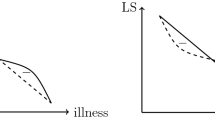Abstract
The two major theories of QOL judgment – livability and comparison theories – are tested. The first states that only absolute level of objective variables will affect QOL, whereas the second states that only differences in objective variables will. A 25-year, 8-nation database was developed that allows more powerful tests than previous research. Consistent with previous studies and with livability theory, absolute level of GDP/person had the largest effect on life-satisfaction. Contrary to previous research, a reliable effect was also found for differences in GDP/person and the consumer price index. The length of these effects is 9 or 10 quarters. That is, consumers take into account changes as far back as 2 or 2 1/2 years, in addition to their absolute level of GDP/person.
Similar content being viewed by others
REFERENCES
Chin-Hon-Foei, Sasqia: 1989, 'Life satisfaction in the EC countries 1975– 1984', in R. Veenhoven (ed.), Did the Crisis Really Hurt? (University Press, Rotterdam).
Diener, E., M. Diener and C. Diener: 1995, 'Factors predicting the subjective well-being of nations', Journal of Personality and Social Psychology 69, pp. 851–864.
Diener, E., E. Sandvik, L. Seidlitz and M. Diener: 1993, 'The relationship between income and subjective well-being: Relative or absolute?', Social Indicators Research 28, pp. 195–223.
Fair, R. C.: 1978, 'The effect of economic events on votes for president', The Review of Economics and Statistics 60, pp. 159–173.
Headey, B. and A. Wearing: 1989, 'Personality, life events, and subjective wellbeing: Toward a dynamic equilibrium model', Social Indicators Research 57, pp. 731–739.
Lance, C. E., A. G. Mallard and A. C. Michalos: 1995, 'Tests of the causal directions of global-life facet satisfaction relationships', Social Indicators Research 34, pp. 69–92.
OECD, Organization For Economic Cooperation and Development: 1996, Quarterly National Accounts (OECD, Paris).
Varey, C. A. and D. Kahneman: 1992, 'Experiences extended across time: Evaluation of moments and episodes', Journal of Behavioral Decision Making 5, pp. 169–185.
Veenhoven, R.: 1993, Happiness in Nations: Subjective Appreciation of Life in 55 Nations 1946–1990 (RISBO, Erasmus University, Rotterdam. Available by FTP).
Veenhoven, R. with the assistance of J. Ehrhardt: 1995, 'The cross-national pattern of happiness: Test of predictions implied in three theories of happiness', Social Indicators Research 34, pp. 33–68.
Author information
Authors and Affiliations
Rights and permissions
About this article
Cite this article
Hagerty, M.R. Unifying Livability and Comparison Theory: Cross-National Time-Series Analysis of Life-Satisfaction. Social Indicators Research 47, 343–356 (1999). https://doi.org/10.1023/A:1006973129588
Issue Date:
DOI: https://doi.org/10.1023/A:1006973129588




